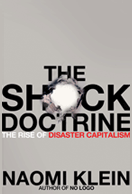The Shock Doctrine

White House Assures PhRMA It Will Drop Plans to Negotiate Medicare Drug Prices
Tom Hamburger, Los Angeles Times, August 4, 2009
"As a candidate for president, Barack Obama lambasted drug companies and the influence they wielded in Washington. He even ran a television ad targeting the industry's chief lobbyist, former Louisiana congressman Billy Tauzin, and the role Tauzin played in preventing Medicare from negotiating for lower drug prices. Since the election, Tauzin has morphed into the president's partner. He has been invited to the White House half a dozen times in recent months. There, he says, he eventually secured an agreement that the administration wouldn't try to overturn the very Medicare drug policy that Obama had criticized on the campaign trail....
"In an interview, Tauzin said he carefully negotiated his agreements with the White House, offering the $80-billion discount program in return for assurances that there would be no government price-setting in Medicare Part D, the drug program for seniors. It was important, he said, to block the threat of Medicare price negotiations, which he called tantamount to price-setting and a threat to the industry. In addition, Tauzin said the industry asked the administration not to allow the import of cheaper drugs because of safety concerns....
" 'Since Obama came into office, the drug industry has received everything it wants, domestic and foreign,' said James Love, who leads an international nonprofit promoting low-cost distribution of drugs to fight the world's most devastating diseases....
"This year, for the first time in two decades, Democrats have so far picked up more of the industry's campaign cash -- 54% -- than Republicans, according to the Center for Responsive Politics."
Blackwater Founder Implicated in Murder
Jeremy Scahill, The Nation, August 4, 2009
"A former Blackwater employee and an ex-US Marine who has worked as a security operative for the company have made a series of explosive allegations in sworn statements filed on August 3 in federal court in Virginia. The two men claim that the company's owner, Erik Prince, may have murdered or facilitated the murder of individuals who were cooperating with federal authorities investigating the company. The former employee also alleges that Prince 'views himself as a Christian crusader tasked with eliminating Muslims and the Islamic faith from the globe,' and that Prince's companies 'encouraged and rewarded the destruction of Iraqi life.'
"In their testimony, both men also allege that Blackwater was smuggling weapons into Iraq. One of the men alleges that Prince turned a profit by transporting 'illegal' or 'unlawful' weapons into the country on Prince's private planes. They also charge that Prince and other Blackwater executives destroyed incriminating videos, emails and other documents and have intentionally deceived the US State Department and other federal agencies. The identities of the two individuals were sealed out of concerns for their safety."
Banks Paid $32.6 Billion in Bonuses Amid U.S. Bailout
Karen Freifeld, Bloomberg News, July 30, 2009
"Citigroup Inc., Merrill Lynch & Co. and seven other U.S. banks paid $32.6 billion in bonuses in 2008 while receiving $175 billion in taxpayer funds, according to a report by New York Attorney General Andrew Cuomo.
"Cuomo analyzed 2008 bonuses at nine banks that received Trouble Asset Relief Program financing from the U.S. government. New York-based Citigroup and Merrill, which has since been taken over by Bank of America Corp., received TARP funding totaling $55 billion, Cuomo said.
" 'When the banks did well, their employees were paid well. When the banks did poorly, their employees were paid well,' Cuomo’s office said in the 22-page report. 'When the banks did very poorly, they were bailed out by taxpayers and their employees were still paid well. Bonuses and overall compensation did not vary significantly as profits diminished.'"
Iraq Auctioning Off Contracts to Big Oil
Gina Chon, Wall Street Journal, June 25, 2009
"Next week, Iraqi officials plan a welcome-back party for Big Oil. The government intends to auction off oil contracts to foreign companies for the first time since Iraq nationalized its oil industry more than three decades ago. If all goes according to plan in the first round, foreign oil companies will move in to help Iraq revive production at six developed fields that have suffered from years of war and neglect....
"Some 120 companies expressed interest in bidding for the contracts at the June 29 and 30 auction, according to the oil ministry. Thirty-five companies qualified to bid, including Exxon Mobil Corp., Royal Dutch Shell PLC, Italy's Eni SpA, Russia's Lukoil and China Petroleum & Chemical Corp., or Sinopec. The six oil fields at stake are believed to hold reserves of more than 43 billion barrels. Foreigners won't get the most prized piece of the action -- ownership stakes in the reserves -- but will be paid fees for ramping up output.
U.S. Overpaid Blackwater by at Least $55 Million
Yochi J. Dreazen, Wall Street Journal, June 16, 2009
"A government audit found that the State Department overpaid the contract-security firm once known as Blackwater Worldwide by tens of millions of dollars because the company failed to properly staff its teams in Iraq.
"The report didn't identify any specific security breaches, but it said the State Department should have withheld at least $55 million in payments to the company because of the shortfalls.
"The audit by the Special Inspector General for Iraq Reconstruction and the State Department's Inspector General said the firm didn't employ enough guards, medics, marksmen and dog handlers to fully man the teams, which were responsible for protecting the U.S. ambassador to Iraq and other high-level officials."
Lending By Bailed Out Banks Continues to Fall
Martin Crutsinger, Associated Press, June 15, 2009
"The value of loans held by the 21 largest institutions getting support from the government's $700 billion bailout fund fell in April, the fifth decline in six months....
"The big banks included in Treasury's monthly loan survey account for more than half of the net loans outstanding at financial institutions."
Banks Use Life Insurance to Fund Bonuses
Ellen E. Schultz, Wall Street Journal, May 20, 2009
"Banks are using a little-known tactic to help pay bonuses, deferred pay and pensions they owe executives: They're holding life-insurance policies on hundreds of thousands of their workers, with themselves as the beneficiaries.
Banks took out much of this life insurance during the mortgage bubble, when executives' pay -- and the IOUs for their deferred compensation -- surged, and banking regulators affirmed the use of life insurance as a way to finance executive pay and benefits.
"Bank of America Corp. has the most life insurance on employees: $17.3 billion at the end of the first quarter, according to bank filings. Wachovia Corp. has $12 billion, J.P. Morgan Chase & Co. has $11.1 billion and Wells Fargo & Co. has $5.7 billion....
"Though not improper, the practice is similar to what is known as 'janitors insurance,' an insurance-on-employees technique that has long been controversial. Critics say the banks' insurance contracts are a way for companies to create tax breaks for funding executive pensions. And some families have complained that employers shouldn't profit from the deaths of their loved ones."
Next Frontier of Disaster Capitalism: Private Equity Firms Controlling Banks?
Eric Lipton, New York Times, May 6, 2009
"For all the talk of the banking crisis, Mr. Flowers and other giant private equity players are circling distressed banks around the country, competing to buy into the industry.....They and other investors see banks as the recession’s biggest prize: potential money machines that could one day generate fabulous returns, particularly after the federal government eats the losses of failed banks, then heavily subsidizes their sale....
"To push their case at the White House, the Treasury and the Fed, Mr. Flowers and others in his industry have enlisted an all-star cast of advisers, lobbyists and lawyers. They include H. Rodgin Cohen, chairman of the Sullivan & Cromwell law firm and Wall Street éminence grise, and Randal K. Quarles, a managing director of the Carlyle Group and a Treasury under secretary in the administration of President George W. Bush. Part of their strategy, Mr. Flowers said, is to persuade the Treasury secretary, Timothy F. Geithner, to pressure the Fed to back down.
"The private equity firms are pitching to regulators a way to let them take control of banks while respecting banking traditions. Essentially, they would separate the entities — they call them silos — that buy the banks, walling off their other private equity investments from any newly created bank holding company. Fed officials will not speak about banks for the record, but they have told the firms that they view the silo concept as little more than a subterfuge....
"Mr. Flowers, in an interview, said he was confident he would prevail. Even if he cannot make the Fed reverse its policy, he will consider it a victory if the Fed approves an individual deal. He has estimated his banking empire will one day earn at least a 35 percent return on banks it has bought in the United States. 'I find it to be an extraordinary time to invest,' he said. He was even more blunt when he spoke to an industry group in New York earlier this year. 'Lowlife grave dancers like me will make a fortune,' he predicted."
World Bank Internal Auditor Says 1/3 of World Bank Health Programs Ineffective
Anthony Faiola, Washington Post, May 1, 2009
"One-third of World Bank health, nutrition and population programs from 1997 through 2007 produced unsatisfactory results, with weak monitoring and overly complex projects contributing to the problem, according to the institution's internal watchdog. The report, released yesterday by the World Bank's Independent Evaluation Group, paints a disturbing portrait of ineffectiveness in areas vital to public health in the developing world. Programs designed to combat HIV-AIDS in Africa, for instance, had only a 25 percent success rate, compared with an 80 percent success rate for World Bank programs overall.
"Many projects lacked a procedure to ensure that the poorest and most needy were receiving assistance. Others were poorly implemented. A $26.6 million HIV-response project in Ghana from 2000 to 2005, for example, failed to target populations at risk of contracting the virus. 'A third of the projects did not meet their objectives,' Cheryl Gray, IEG director, said. 'Over-complexity is a problem, as is the lack of capacity of countries to implement the programs.'"
Wall Street Pay Returning to Outrageous 2008 Level
Louise Story, New York Times, April 26, 2009
"Workers at the largest financial institutions are on track to earn as much money this year as they did before the financial crisis began, because of the strong start of the year for bank profits. Even as the industry’s compensation has been put in the spotlight for being so high at a time when many banks have received taxpayer help, six of the biggest banks set aside over $36 billion in the first quarter to pay their employees, according to a review of financial statements....
"Of the large banks receiving federal help, Goldman Sachs stands out for setting aside the most per person for compensation. The bank, which nearly halved its compensation last year, set aside $4.7 billion for worker pay in the quarter. If that level continues all year, it would add up to average pay of $569,220 per worker — almost as much as the pay in 2007, a record year."















